Remembering the election of 1885…
A lot has changed in the past 139 years but we are still using essentially the same archaic voting system
This is again a long newsletter. If it is truncated and you cannot read the whole message, click on “View entire message” and you will be able to view the entire post in your email app.
By Alan Story
On Thursday (2 May), voters in 107 local authorities across England will be heading to the polls to elect councils. In addition, there will be 11 metro mayors + the Mayor of London elected, as well as members of the London Assembly and 37 Police and Crime Commissioners. Later in 2024, there will be the general election.
A lot has changed since elections were held in days of yore, for example, in 1885 when William Ewart Gladstone1 was again elected as British Prime Minister. The son of a wealthy slave owner, Gladstone and his Liberal Party were defeated in the next year. But he was PM for a total of 12 years and 126 days in all.
PM William Ewart Gladstone
Today, elections are, thankfully, no longer contests between estate-owning male aristocrats and squires. Men of all classes, not only those owning property, can vote. So too can all women, though all genders must be aged 18 … at least in England.
The election issues are, of course, also rather different today, though structural inequality is still rife and the archaic British class system shows few signs of crumbling.
As for the electoral process itself, the votes cast these days are tallied in essentially the same archaic way as they were in the 1885. That way is called First-Past-The-Post (FPTP).
FPTP is a blatantly unfair and undemocratic system and most people with a democratic bone in their body say it should be put onto the proverbial dustbin of history.
Don’t Abolish Child Labour
No surprise then that the leadership of both the Tory and Labour parties cling onto FPTP just like those in the 1880s who were opposed to the abolition of child labour. Or who took the wrong side on another “hot” political topic of the 1880s: “Home rule for Ireland? NEVER!”
To be clear: there is far more to progressive politics than contesting elections. Nor should we expect that elections might usher in New Jerusalem. And many more political reforms are needed in the UK in this decade and in coming decades than merely changing the electoral system. (Note to a few leftie friends who think electoral reform is middle-of-the-road clap track: the alternative voting system, namely PR (proportional representation) does NOT stand for “Proletarian Revolution”. Rather, it is a badly-need democratic reform.)
As this Thursday is voting day in many local areas in England and as 2024 will be a voting year in the UK—unless Sunak is especially desperate and holds off the UK vote until the last possible date2, namely 28 January 2025—The Left Lane today looks at what is wrong with FPTP. Usually the debate is focused on elections to Westminster. This piece looks at local elections.
2024 Elections Essentially the Same as in 1885
The 1885 general election was chosen as the baseline because that was when, “for the first time a majority of adult males could vote and most constituencies by law returned a single member to Parliament.”3 Add all men as well as women voters and general elections today are basically run on the same principles as they were in 1885. Those principles—and changing the word “constituencies” to “wards”—are also how local elections will operate in a few days from now. In a word: Depressing.
Another label applied to FPTP voting is “winner takes all”. A party getting second- place in every ward in a 50-ward election across a city or town on 2 May would not win a single seat on its local council.
As we will see in a minute, the number of wards won by a party bears no relation to the total votes cast across a local authority. Manchester City Council, which uses FPTP, provides Exhibit A. Exhibit B is Edinburgh City Council which, like all local elections in Scotland, uses a form of PR. PR wins the overall fairness argument hands down.
This contrast in fairness has many consequences. Under a PR electoral system, every vote counts. Under FPTP, many votes have no effect on the result. They are wasted. Consciously or unconsciously, many people realise there is little point in voting. In most cases, the winner is known in advance.
Voter Turnout Was 32.0 %
In the 2023 local elections for 230 English authorities, “the turnout … was 32.0%”4 according to The Electoral Commission. This was more than 10 per cent lower than local elections in Scotland5 in 2022.
I don’t have the stats to hand for voter turnout in local elections in Sweden and elsewhere using PR, but the chart below comparing voter turnout in national elections held in various countries makes its point clearly: using PR boosts turnout.
Source: Fair Vote Canada
Impregnable to Change
A second consequence of using FPTP is that “turfing the buggers out” is very difficult and many local councils are almost impregnable to change. I chat regularly to mates who live in Liverpool and they tell me its Labour-controlled council dates from the ice age (well, not literally). In the 2023 Liverpool Council elections6, Labour won 61 of the 85 seats on 53% of the total vote.
The same story of unresponsiveness can be told about Tory-controlled councils. I have a friend who lives in West Northamptonshire and she tells me its rock-hard Tory council is, bluntly, a grazing ground for extinct creatures. And while the LibDems as a party endorse PR, the Councils for PR7 group reports that some LD-controlled councils are “reluctant” to pass a motion calling for PR at Westminster elections8.
At both the local and national level, a FPTP voting system has a strong tendency to create huge and unrepresentative majorities. That makes it very difficult for opposition forces to dislodge them. (I look ahead to the creation of a mass socialist party that could!)
Again look below at Manchester City Council. All progressives dislike the ideology of the Tories, but who with democratic instincts can be pleased with what is shown on the bar chart below. (Here is a link to a somewhat technical analysis of the possible negative consequences of a Labour landslide.)
Source: https://twitter.com/LeftieStats/status/1782444710482591767/photo/1
The same 21 April poll showed Labour on 43% of the overall vote. (It is worth noting that Labour under its previous leader Jeremy Corbyn won 40% of the total vote in the 2017 general election.)
On both the local and national level, FPTP reinforces both authoritarianism and “my-party-firstism”.
Recent Manchester & Edinburgh Elections
This is a Substack article, not a PhD. dissertation in political science with 150 pages of empirical evidence. I seek to compare only one local election using FPTP, namely Manchester, with one local election using one form of PR, namely Edinburgh.
Below are the stats for the most recent council election in Manchester. While there are 96 seats on this Council, a third of the seats are elected in any given year and elections are held every three years in every four.
Source: https://en.wikipedia.org/wiki/2023_Manchester_City_Council_election
The conclusions are obvious: this was an unfair result. Labour won 30 of the 33 seats on less than 2/3 of the total vote. It is a good example of what “winner takes all” means in practice.
In a fair and proportionate election, Labour would have won only about 22 seats and all three of the other parties listed here would have picked up quite a number of more seats. Moreover, as votes for these other parties are mostly wasted, many of their supporters will often rightly conclude: the deck is stacked against us and so what is the point of even going to vote.
As noted above, every vote counts under PR. If voting in local elections was changed from FPTP to PR, the votes for a perennial losing/ second place party would surely increase. (In some local elections in England, the LibDems and the Greens are not perennial losers.)
It is no surprise that in England, the two biggest beneficiaries of FPTP at both the local and national level are Labour and the Tories. (Some LibDem councils in the south also benefit.)
Now let’s look at a local council election in Scotland where PR is used.
Source: https://en.wikipedia.org/wiki/2022_City_of_Edinburgh_Council_election
The contrast with Manchester is startling. Yes, on proportionate / percentage grounds, the SNP are somewhat over-represented—that is, they won more seats than their overall vote entitles them to—and the Conservatives are slightly under-represented. But for the three other parties, the differences between votes cast and seats won are minimal.
This Edinburgh result is what a fair election result looks like. The results in Manchester look like they are from Gladstone era of 1885. On 2 May in England we will witness the same skewed results.
In the past, the one-sidedness in Manchester has been even worse. For example, there were not any opposition councillors at all sitting on Manchester Council between 2014 and 2016. All 96 councillors were from Labour.9
Unlike Keir Starmer, Manchester mayor Andy Burnham is a strong supporter of PR for Westminster elections. Next time someone is chatting with Burnham he should be asked: do you support PR for local elections as well? Burnham is no fool. He knows that if PR was used in future for Manchester Council elections, Labour could lose as many as 30 of the 96 council seats. At present Labour holds 86 of them and one is vacant.10
A Few Conclusions
Here are a few brief conclusions:
I hope you are convinced we need electoral reform in how we choose local councils. Elections are supposed to be run for the public interest, not to serve partisan interests. Perhaps some councils can be convinced as well.
But as we live in one of the most centralised countries in the world, a local council does not have the power to change how it is elected. Westminster alone has that power. And the leaderships of the only two parties that can win in our electoral duopoly11 and that are both the main beneficiaries of FPTP are both also opposed to PR.
In September 2022, Labour Party members overwhelmingly voted for PR to be in Labour’s manifesto for the next general election… but then acting on what a democratic majority wants has never been Keir Starmer’s strong suit. (Witness his support for Israel’s genocide of the Palestinian people.)
So the campaign to win PR for local elections must begin by campaigning for PR for Westminster elections. Once PR is won for elections to the House of Commons, PR will surely follow for local elections. That is what happened in Scotland where PR has been used to elect members of the Scottish parliament for more than 20 years.
The mainstream media say the local elections will act as a helpful predictor of the general elections. They will do no such thing. Instead, they will give us the results of hundreds of unfair local contests.
Elections to the London Assembly use a form of proportional representation. Why can’t voters in Birmingham, Manchester, Nottingham and other cities, as well as voters in rural areas, also have PR to elect their councils on a far more democratic basis? How do Sunak and Starmer explain the double standard?
Opposition and progressive forces are badly weakened by FPTP in local elections. Unless they are concentrated in a few neighbourhoods or wards—how likely is that?—their voices will go unheard on election day or be significantly under-represented.
Some parties which are significantly under-represented at Westminster think that winning local elections will act as a springboard to winning more seats in the House of Commons. They are badly deluded.
Take the case of the Green Party of England and Wales. There is little doubt that more Greens will be elected to local councils in England on 2 May. But look at the maths over the past 14 years.12 In 2010, when Caroline Lucas first won Brighton Pavilion, the Greens had a mere 116 local councillors. Today, and four general elections later, the Greens now have over 700 local councillors, but Lucas remains the sole Green MP.
There are basically only two ways for smaller parties to break through the FPTP electoral duopoly in a parliament. One is to have your voting base concentrated in a relatively concentrated geographic area. That is how the Scottish National Party has been able to win so many seats in Westminster. The same thing has happened in Canada with parties concentrated in the province of Québec. I suppose the Green Party could elect more MPs if tens of thousands of its members relocated to a city such as Bristol—it will have five constituencies in the next general election—but that’s is a pretty fanciful idea.
The other way to win PR on a UK wide-basis would be for the Green Party to campaign for PR in an effective and concentrated way. It has failed to do this. Indeed, it does not even campaign effectively on what should be its signature issue, the environment and climate change.
There is not a significant jurisdiction anywhere in the world where the Greens are serious political players and which does not also use PR. The Scottish Greens, who are much in the news these days, would probably have one or two members at Holyrood—and not seven—if the Scottish Parliament was elected by FPTP.
There are many reasons why so many people are today totally alienated from politics. With seldom a dissent, many mainstream politicians are ramping up the dangers of war. Israeli genocide in Gaza continues at a murderous pace. Climate change targets are being revamped. The economic crisis is hitting more and more people; on the high street of my town in Suffolk, more and more shops are shutting down on a weekly basis. Disabled people are in Sunak’s crosshairs. AGAIN. The duplicity of much of the mainstream media is breath-taking. And we have no serious political opposition; the Tories and Labour feed from the same ideological trough.
There is at least one more reason for this alienation: millions know their vote is wasted in local and UK-wide elections.
We cannot get PR too soon. Let’s move on from 1885.
Thanks to my mates in Get PR Done! and the Learning Our Histories projects for their editorial assistance in preparing today's The Left Lane.
Edited by Alan Story, The Left Lane is a reader-supported publication. To receive new posts and support our work, consider becoming a free or paid subscriber.
You can reach us at: theleftlanepolitics@gmail.com

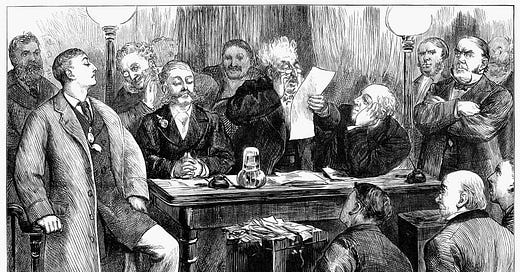



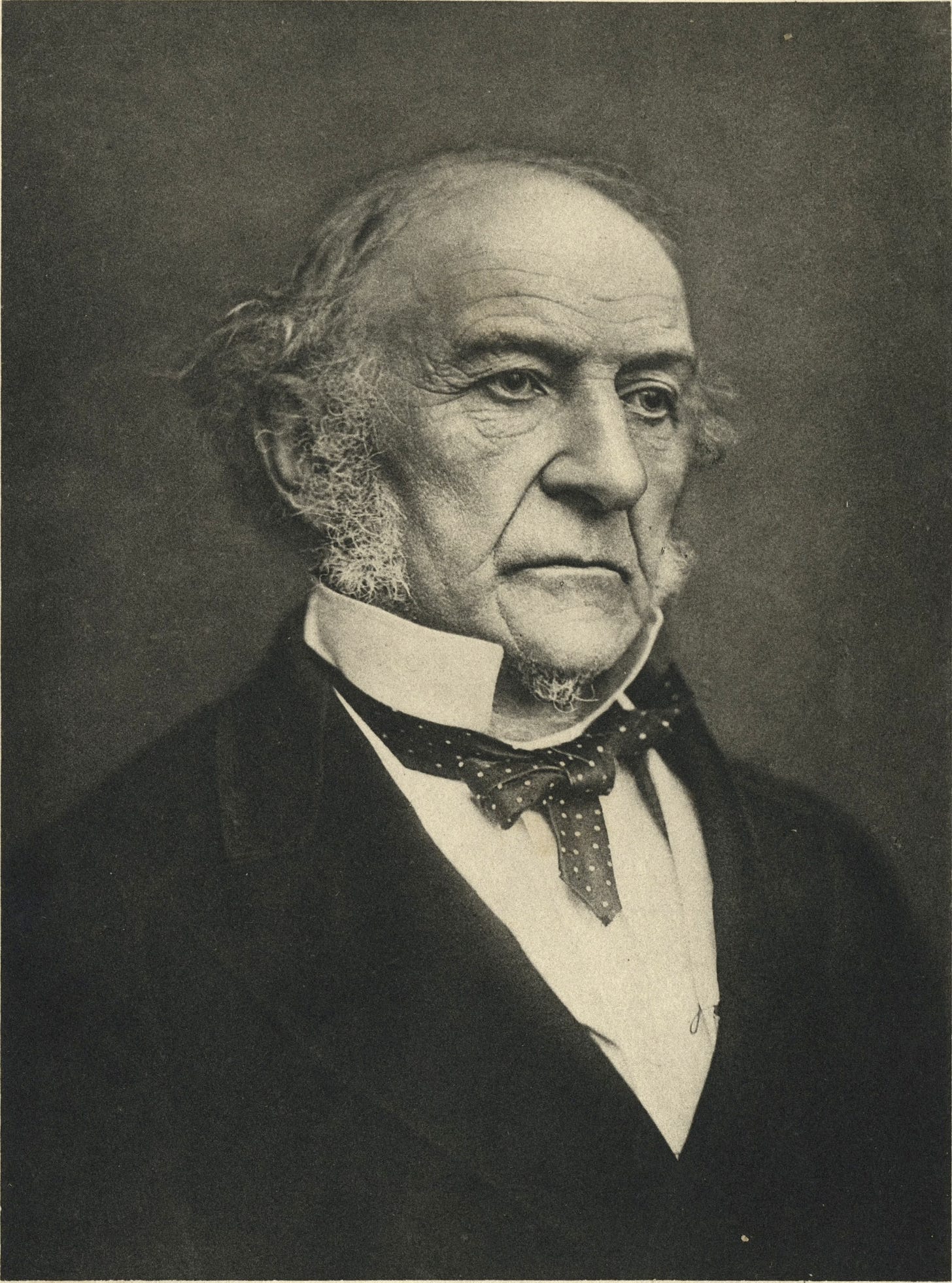
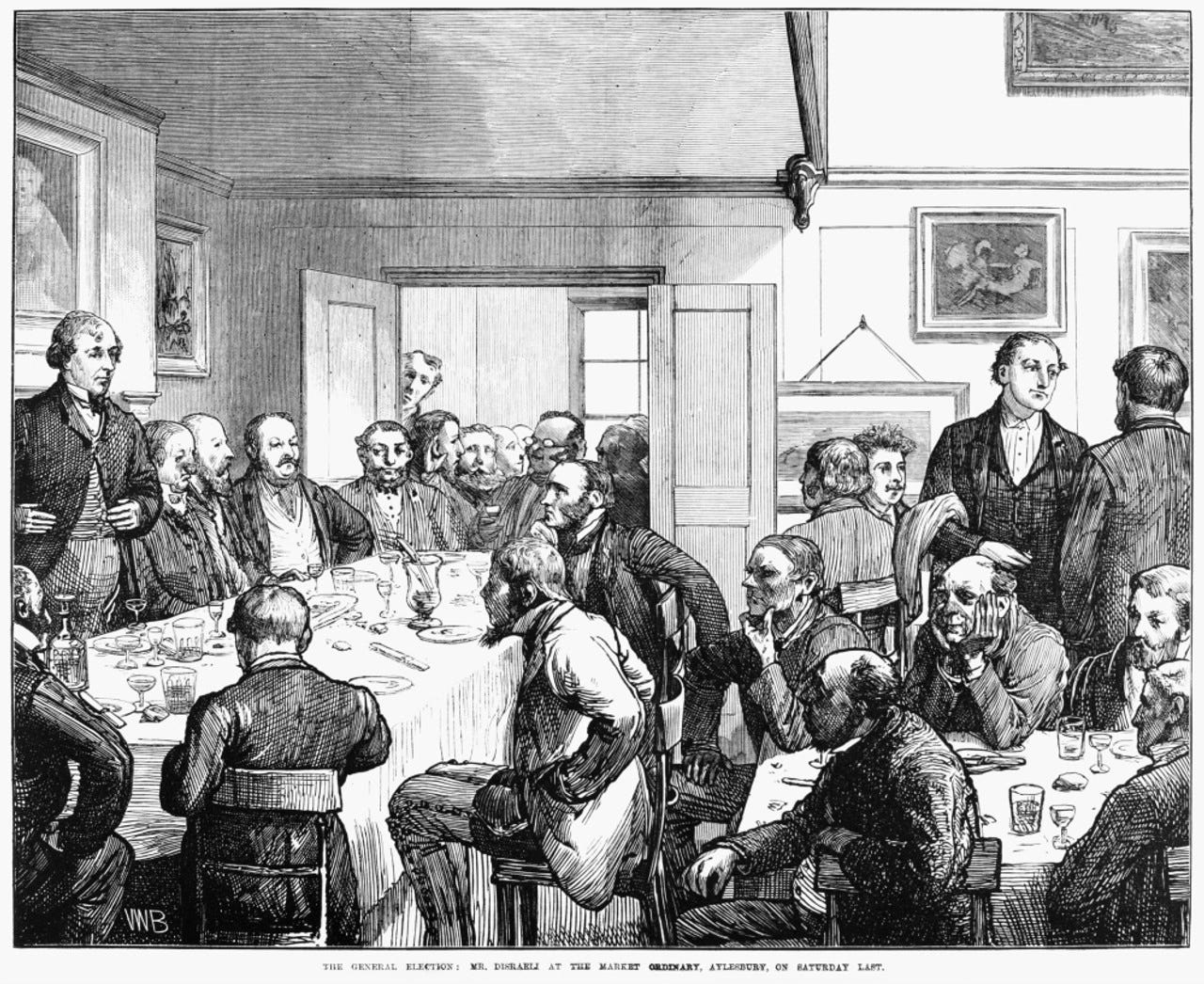
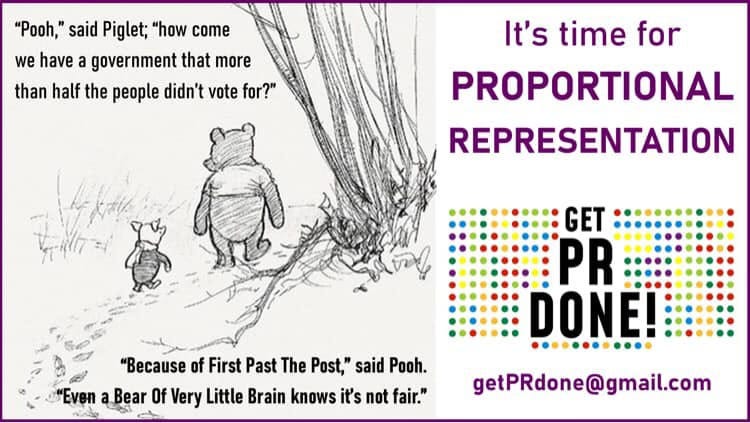



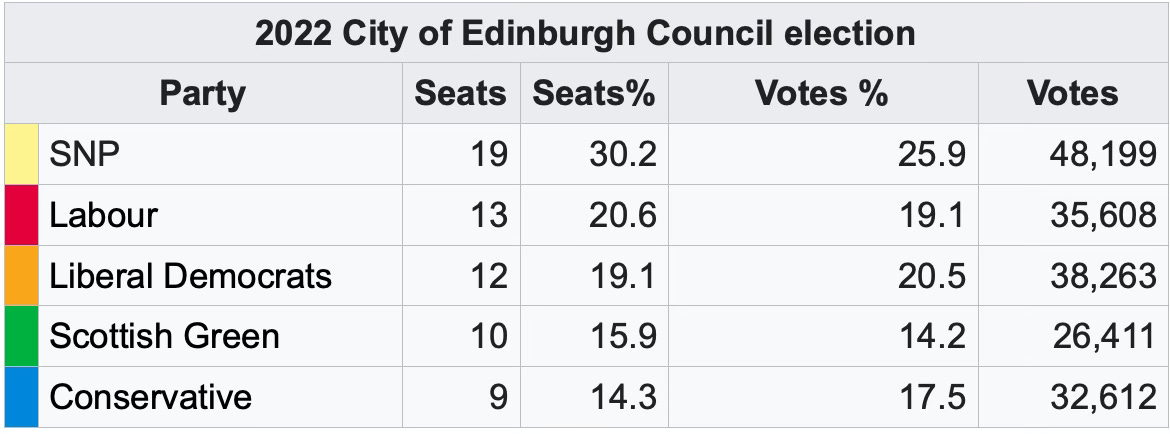
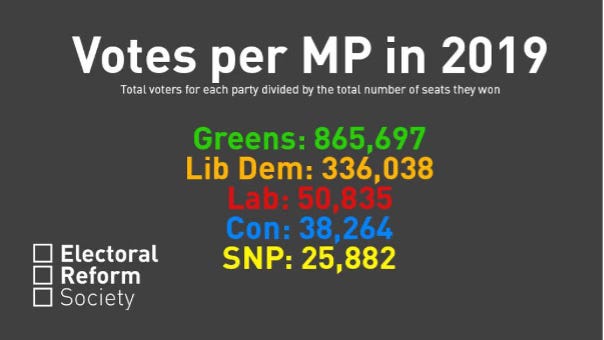

Great article.
It really is appauling that we still use FPTP.
For any hope of change we need to get PR done!
Well explained Alan. We really need PR.